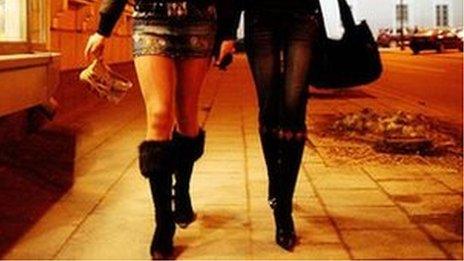Sex workers speak out on how prostitution should be policed
- Published

Research says the majority of sex workers advertise their services online.
Three sex industry insiders have shared their views of the impact of criminalising the purchase of sex in candid interviews with the BBC.
Eighty percent of the Northern Ireland public support proposals currently before Stormont which will criminalise the purchase of sexual services.
The new law is designed to curb demand for women trafficked into prostitution.
But research has claimed a large majority of sex workers fear the proposal will put them at greater risk.
'Claire'
'Claire' advertises a full range of sexual services on a leading escort website. For part of the week she is based in Belfast, receiving between one and six clients a day, charging £90 for 30 minutes or £150 for a full hour.
"I only work during the day. I'm not interested in people coming out of pubs drunk so I finish at 8pm."
She said she has turned away clients that have wanted to take drugs while with her.
Working independently, without a "booker" or pimp, and working alone from a rented flat means she is not breaking the law.
"I'm a law-abiding citizen." she said.
Financial hardship
Referring to the criminalisation of paying for sex, she added: "Even though I would not be a criminal, I would be associated with criminals. I'm actually turning people into criminals, and that I don't like."
The well-spoken 46-year-old English graduate first considered a career as an escort after experiences as a swinger.
But she describes the financial hardship, caused by her ex-husband stopping child support payments, as the "catalyst" that propelled her into prostitution.
She plans to continue working for a couple more years, and is currently studying for two diplomas that will allow her to change careers.
Exit strategy
She said: "The idea is to clear some debts I got when I was a single parent.
"I have no regrets about doing this job. It's not something that I'm desperate to get out of, but I feel it's something I need to be single to do, and at my age, maybe it would be nice to be with somebody."
She enforces a minimum age limit of 23 and her clients come from both blue and white-collar professions. She says some have disabilities, and others lack social skills to make contact with women.
She also claims she has been visited by virgins aged from 24 to 40, as well as single men, and men in sexless relationships.
She said: "When you're being intimate with someone you're more likely to tell them something."
She said many clients confided personal and emotional secrets in her.
"There is a lot of counselling involved in this job," she said.
Decriminalisation
Claire feels that a licensing system, like that implemented in New Zealand, which decriminalises sex work, and establishes rules by which it can be policed, would benefit independent workers like her.
The New Zealand model allows up to four women to work from the same property, and Claire feels this would increase her security, although she has never had any incidents of violence from her clients.
In principle, a licensing system would also allow the police to focus their efforts on targeting trafficked and coerced sex workers.
Some statistics suggest that cases of trafficked sex workers have declined in New Zealand since this system was implemented.
Claire has not had any encounters with the PSNI, but feels wary that they could use their powers to move her out of her rented apartment if they wanted, even though she operates within the law.
Ruth Jacobs
Ruth Jacobs is a writer and former sex worker, who worked in London.
She said: "When I was selling sex, I was a drug addict. I was an absolute mess, but criminalising my clients wouldn't have helped me. It would have made things far more dangerous.
"I wouldn't have used the term sex worker for myself because, although it was a way to make money, it wasn't work like another job. It was traumatic."
Legal motives
Ms Jacobs claims there was a hidden agenda behind the legislation Lord Morrow was proposing.
She said: "I believe there's a lot of moral crusading going around, and pretending to want to stop trafficking, but really they want to end the purchasing of sex.
"That's really dangerous because then trafficking victims aren't being served, and sex workers are denied their rights and put in danger," she said.
Ms Jacobs points to the policing model adopted in Merseyside, where the police have changed their focus from enforcement to protection of sex workers.
They have classified sex workers as a minority so attacks against them are considered hate crimes.
They work with outreach projects to help enforce area where prostitutes operate, and provide exiting services.
"Exiting services are really important," said Ms Jacobs.
"Counselling, help with housing, referral to other services. When you've got no qualifications and no work history, these things aren't minor. People can't leave sex work if they can't make money some other way."
'Anna'
'Anna' is a Romanian woman who was abducted from London in 2011 and flown to Ireland where she was forced into sex work under the threat of violence to her and her family.
After nine months, her traffickers had moved her to Northern Ireland and she was able to escape.
She believes that criminalising the purchase of sex would help people in the situation she was forced into.
Referring to criticism that the bill may drive trafficking further out of reach of the authorities, she said: "This is already underground. The only thing that will go underground would be the sex industry which would have to lose their major income.
"Their companies will go underground, not the girls who are used and abused."
She said: "I would be really really happy if it would pass. Definitely it would be a good decision for everybody within Northern Ireland."
- Published17 October 2014

- Published20 October 2014
